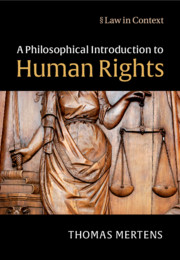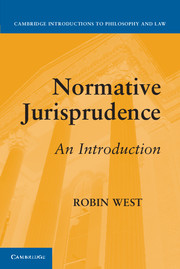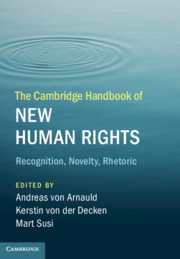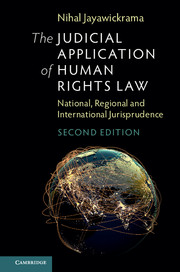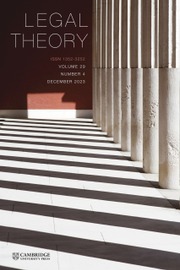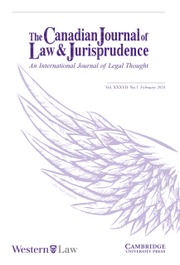A Philosophical Introduction to Human Rights
Part of Law in Context
- Author: Thomas Mertens, Radboud Universiteit Nijmegen
- Date Published: November 2020
- availability: Available
- format: Paperback
- isbn: 9781108402828
Paperback
Other available formats:
Hardback, eBook
Looking for an examination copy?
This title is not currently available for examination. However, if you are interested in the title for your course we can consider offering an examination copy. To register your interest please contact [email protected] providing details of the course you are teaching.
-
While almost everyone has heard of human rights, few will have reflected in depth on what human rights are, where they originate from and what they mean. A Philosophical Introduction to Human Rights – accessibly written without being superficial – addresses these questions and provides a multifaceted introduction to legal philosophy. The point of departure is the famous 1948 Universal Declaration of Human Rights, which provides a frame for engagement with western legal philosophy. Thomas Mertens sketches the philosophical and historical background of the Declaration, discusses the ten most important human rights with the help of key philosophers, and ends by reflecting on the relationship between rights and duties. The basso continuo of the book is a particular world view derived from Immanuel Kant. 'Unsocial sociability' is what characterises humans, i.e. the tension between man's individual and social nature. Some human rights emphasize the first, others the second aspect. The tension between these two aspects plays a fundamental role in how human rights are interpreted and applied.
Read more- Discusses ten central human rights in ten chapters, which can be read independently
- Valuable both for beginners and those more advanced
- Where most introductions in legal philosophy are based on contemporary literature, this book relies heavily on classical authors, most notably Kant
- Suitable as an introductory text for both legal philosophy and human rights
Reviews & endorsements
‘Thomas Mertens has long been admired as a political and legal philosopher, equally at home in Anglo-American and German thought, who writes with unusual insight about the most important issues in his field. His argument in this book is that human rights are central to the great debates of philosophy of law and it will persuade its audience by the clarity of its exposition and by its adroit and effective use of real-world examples.’ David Dyzenhaus, University Professor of Law and Philosophy, University of Toronto
See more reviews‘Thomas Mertens' new book on human rights is a highly perceptive and comprehensive examination of the key questions that are raised by the topic. Mertens sets human rights in the context of legal philosophy and analyses in a systematic way the relationship between morality and law; natural law and positive law; international law and national law. A legal Kant scholar of renown, Mertens turns his attention with good effect to the legal and philosophical study of human rights. Written with freshness and clarity, the book will be accessible to all students of law, politics and philosophy, and members of the public with an interest in the topic. The book is vital reading for the twenty-first century. It demonstrates how we owe a good deal to the war-torn, but ultimately progressive, twentieth century. There are countless interesting examples that are drawn from that turbulent century which enliven the discussion.’ Howard Williams, Honorary Distinguished Professor, Cardiff University
‘Thomas Mertens’ book is much more than a handbook on human rights: it uses this topic as a starting point for introducing the readers to philosophy of law and its many questions. Given the centrality of human rights in our societies, this is a justified, clever move. While analysing some major rights as they are stated by the UDHR, Mertens discusses a wide range of arguments for and against their universal or absolute character. In doing so, he invites us to an intellectual tour de force in which history of philosophy and theoretical argumentation are ingeniously intertwined. This ambitious endeavour goes together with philosophical honesty and restraint: the author never forces his position on the readers; he just presents them with the philosophical tools to form their opinion. Also for this reason, this compelling introduction to philosophy of law is highly enjoyable and instructive.’ Alessandro Pinzani, Professor of Political Philosophy at the Federal University of Santa Catarina (UFSC), Brazil
Customer reviews
Review was not posted due to profanity
×Product details
- Date Published: November 2020
- format: Paperback
- isbn: 9781108402828
- length: 310 pages
- dimensions: 243 x 169 x 16 mm
- weight: 0.54kg
- availability: Available
Table of Contents
1. Legal philosophy and human rights
Part I. Backgrounds of the universal declaration
2. The political and juridical context of the universal declaration
3. The philosophical context of the universal declaration
4. Human dignity
5. Intermezzo I
Part II. Negative freedom:
6. Everyone has the right to life
7. No one shall be subjected to torture
8. No one shall be unfairly punished
9. Everyone has the right to their own space
10. Everyone has the right to property
Part III. Positive freedom
11. Everyone has the right to take part in the government of his country
12. Everyone has the right to 'nationality'
13. Everyone has the right to belong
14. Everyone has the right to a decent standard of living
15. Everyone has the right to international legal protection
Part IV. Duties and virtues:
16. Intermezzo II
17. Everyone has the duty to obedience
18. Everyone has the duty to behave with moderation.
Sorry, this resource is locked
Please register or sign in to request access. If you are having problems accessing these resources please email [email protected]
Register Sign in» Proceed
You are now leaving the Cambridge University Press website. Your eBook purchase and download will be completed by our partner www.ebooks.com. Please see the permission section of the www.ebooks.com catalogue page for details of the print & copy limits on our eBooks.
Continue ×Are you sure you want to delete your account?
This cannot be undone.
Thank you for your feedback which will help us improve our service.
If you requested a response, we will make sure to get back to you shortly.
×
